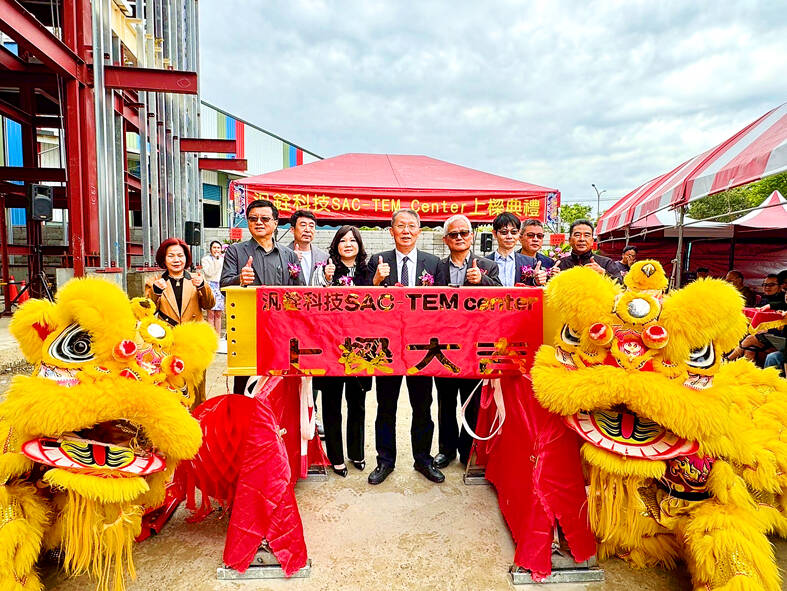Msscorps Co (汎銓科技) yesterday said it expects silicon photonics-related and artificial intelligence (AI) analysis services to fuel revenue growth, as it benefits from the AI boom.
The company provides advanced semiconductor materials analysis and failure analysis to semiconductor firms, including Taiwan Semiconductor Manufacturing Co (台積電).
The Hsinchu-based firm expects revenue from silicon photonics and AI analyses to double or triple in April next year, compared with this month, Msscorps chairman Gino Leou (柳紀綸) told reporters.

Photo courtesy of Msscorps Co
“We are seeing strong growth momentum from this segment,” Leou said. “Msscorps is leading its peers in providing comprehensive services from chip testing, [material and failure] analysis to co-packaged optics [CPO] services.”
CPO technology has become a widely discussed topic among semiconductor analysts and investors after Nvidia Corp last month said that it planned to introduce the new technology for its next-generation switch platforms for server racks.
However, the AI giant did not say it would adopt CPO technology for its next graphics processing unit (GPU), dubbed Rubin, as most analysts expected.
Msscorps expects to see explosive growth in silicon photonics-related and AI chip testing and inspection services from the second half of this year.
The new business is expected to gradually increase its contribution to overall revenue from 5.5 percent last year to 10 percent in 2027, it said.
Another growth driver would be its advanced inspection and analysis services for angstrom-scale process technology, which is the major revenue source for the firm, Leou said.
Revenue from advanced inspection and analysis services for cutting-edge process technologies would expand 20 to 30 percent through April next year, he said.
To meet a key customer’s demand, the company yesterday held a topping ceremony for a new facility in Hsinchu to house a new inspection equipment — a spherical aberration corrected scanning transmission electron microscope (Cs-STEM), which costs at least US$4 million.
Msscorps expects to start utilizing the new Cs-STEM in August.
Semiconductor material and failure analyses are vital for chipmakers to ramp up production yield, as chip design migrates to smaller nodes, such as 16 angstroms or 14 angstroms, and semiconductor structure becomes more complex. Inspection and metrology tools are utilized to make sure each manufacturing step is optimized.
By using automated transmission electron microscope-based metrology instruments, Msscorps can provide accurate and timely semiconductor material inspection, lower manufacturing costs and shorten the product development cycle.
“We have invested heavily on sourcing new equipment. Those investments would pay off from the second half of this year,” Leou said.
The company is optimistic about this year’s revenue prospects, as overseas markets, including China, the US and Japan, are to start generating revenue later this year, Leou said.
Revenue this year is forecast to surpass last year’s NT$1.97 billion (US$59.54 million), he said.
The company is also scouting a suitable site to build a new laboratory in Germany or the Czech Republic to provide real-time services, as requested by its key customer.

In Italy’s storied gold-making hubs, jewelers are reworking their designs to trim gold content as they race to blunt the effect of record prices and appeal to shoppers watching their budgets. Gold prices hit a record high on Thursday, surging near US$5,600 an ounce, more than double a year ago as geopolitical concerns and jitters over trade pushed investors toward the safe-haven asset. The rally is putting undue pressure on small artisans as they face mounting demands from customers, including international brands, to produce cheaper items, from signature pieces to wedding rings, according to interviews with four independent jewelers in Italy’s main

Japanese Prime Minister Sanae Takaichi has talked up the benefits of a weaker yen in a campaign speech, adopting a tone at odds with her finance ministry, which has refused to rule out any options to counter excessive foreign exchange volatility. Takaichi later softened her stance, saying she did not have a preference for the yen’s direction. “People say the weak yen is bad right now, but for export industries, it’s a major opportunity,” Takaichi said on Saturday at a rally for Liberal Democratic Party candidate Daishiro Yamagiwa in Kanagawa Prefecture ahead of a snap election on Sunday. “Whether it’s selling food or

CONCERNS: Tech companies investing in AI businesses that purchase their products have raised questions among investors that they are artificially propping up demand Nvidia Corp chief executive officer Jensen Huang (黃仁勳) on Saturday said that the company would be participating in OpenAI’s latest funding round, describing it as potentially “the largest investment we’ve ever made.” “We will invest a great deal of money,” Huang told reporters while visiting Taipei. “I believe in OpenAI. The work that they do is incredible. They’re one of the most consequential companies of our time.” Huang did not say exactly how much Nvidia might contribute, but described the investment as “huge.” “Let Sam announce how much he’s going to raise — it’s for him to decide,” Huang said, referring to OpenAI

The global server market is expected to grow 12.8 percent annually this year, with artificial intelligence (AI) servers projected to account for 16.5 percent, driven by continued investment in AI infrastructure by major cloud service providers (CSPs), market researcher TrendForce Corp (集邦科技) said yesterday. Global AI server shipments this year are expected to increase 28 percent year-on-year to more than 2.7 million units, driven by sustained demand from CSPs and government sovereign cloud projects, TrendForce analyst Frank Kung (龔明德) told the Taipei Times. Demand for GPU-based AI servers, including Nvidia Corp’s GB and Vera Rubin rack systems, is expected to remain high,